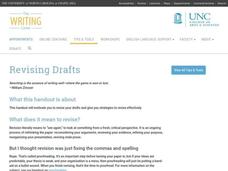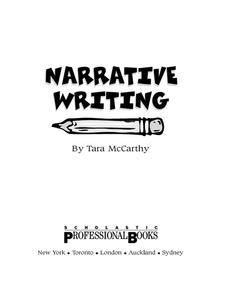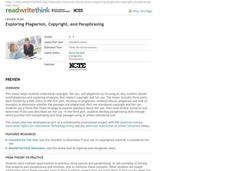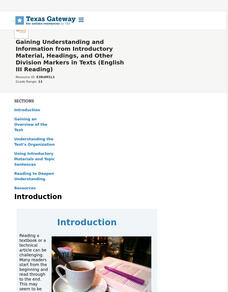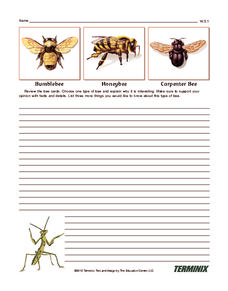University of North Carolina
Revising Drafts
Don't simply proofread ... revise instead! Revising drafts is the topic of the 17th handout in UNC's Writing the Paper series of 24 lessons. Writers discover the importance of revision, as well as steps to follow during the process.
Teach It Primary
What Letter Will You Write?
After reading "The Pied Piper of Hamelin," scholars discuss the emotions the events provoked in its characters. In pairs, writers compose a letter depending on the topic and style of their choice then reply to their own or a peer's...
Poetry4kids
Twenty Fun Writing Prompts for Kids
Twenty prompts reinforce scholars' writing skills of essays and poems. Prompts cover topics such as superpowers, holidays, the weather, and more!
Anchorage School District
Writing Reference Sheet
Print out this handy reference page double sided and distribute it to your class. Individuals can use the page to aid them as they work on their topic sentences, transitions, conclusions, and paragraph structure. There is plenty of...
Prestwick House
Writing Arguments in Response to Nonfiction
Emotional appeal or argument? That is the question. An informative lesson helps your class recognize the difference between a logical argument and an emotional appeal and learn how to craft an argumentative response. Writers develop a...
Poetry4kids
How to Write a Diamante Poem
A lesson begins with a description of a diamante poem and the rules to follow while writing one. Scholars examine the ins and outs of synonym and antonym diamantes, then compose an original poem using their newfound knowledge.
Curated OER
Organizing Writing to Convey a Central Idea
Fourth and fifth graders practice the skill of organizing their writing to convey a central idea by sorting 14 facts about the dogwood tree into four categories of facts. The categories, which are written on the board, are; Governmental...
Scholastic
Narrative Writing
If you're looking to start a unit based around narrative writing, make sure to consider this resource while you're planning. This book covers five topics: writing personal narratives, writing narratives about others, writing narratives...
Scholastic
A Reading Guide to A Wrinkle in Time
Accompany a reading of Madeleine L'Engle's classic tale, A Wrinkle in Time, with a detailed guide equipped with 15 informative and useful chapters. Scholars discover who the author is, why she wrote the book, and crucial story elements...
Curated OER
A Whale of Importance to the Arctic People
The bowhead whale of the Arctic region is of great importance to the people that live there. Your class will brainstorm all they know about this wonderful whale and create an informational video, which they will share with the children...
Lakeshorelearning
Read and Write about It
Reading informational text is a skill that transcends subjects and grade levels. Practice reading about different topics in various formats with a language arts lesson that includes opportunities for writing and research as well.
University of North Carolina
Annotated Bibliographies
When researchers write a paper, they become curators of information. It's their job to determine the best sources of information on a topic and use those sources to inform their writing. As part of a larger series, a handout on annotated...
Houghton Mifflin Harcourt
Writing Prompts for Middle School
Scratching your head when it comes to engaging writing prompts? Check out a list of prompts designed for middle school classes, which includes topics for persuasive writing, expository writing, how-to essays, personal narratives, and...
Overcoming Obstacles
Writing Reports
Following a review of how to research and take notes, scholars define the term paraphrase and identify ways to organize information and finish reports. To put their newfound knowledge to the test, learners interview a peer, take notes,...
Polk Bros Foundation
How to Summarize a Non-Fiction Passage
After reading a text, one way to find out how much your class comprehended is to ask your pupils to summarize. This worksheet helps class members prepare for writing a summary of a nonfiction text. They note down the topic, up to eight...
ReadWriteThink
Exploring Plagiarism, Copyright, and Paraphrasing
Plagiarism, copyright, and fair use are the focus of a three-part instructional activity designed to inform scholars of how to properly cite others' work. First, pupils use a KWL chart to begin thinking and discussing plagiarism. They...
Texas Education Agency (TEA)
Gaining Understanding and Information from Introductory Material, Headings, and Other Division Markers in Texts (English III Reading)
All teachers are teachers of reading! The 13-part interactive series ends with a lesson that teaches learners (and their instructors) how to approach reading their textbooks. After learning about several strategies, users test their...
Curated OER
Learning From World War II and Connecting It to the Present
Compare and contrast World War II to the modern Iraq war with this instructional activity. After watching a film, learners use supporting evidence to support their point of view of the conflicts. Using the internet, they create a...
Curated OER
Writing: Narrative, Expository, Persuasive, and Descriptive
If you are interested in having a basic framework for teaching expository, narrative, persuasive, and descriptive writing, this resource may help; however, you will have to find information on the different forms of writing to share with...
Curated OER
Letter Writing - Formal
Although rarely used these days, letter writing is still a form of writing reviewed in schools. After examining written letters, middle schoolers discuss characteristics of a formal letter and its parts. They choose a famous person to...
Terminix
Bee Writing Prompt
What do your pupils know about bees? Ask them to examine facts and images about three different types of bees and write about one type. Pupils explain why their chosen bee is interesting and back up their ideas with facts and opinions....
EngageNY
Revising: Strong Conclusions for My Accessing Books Around the World Informative Paragraph
It's important that writers leave their readers with a strong and satisfying conclusion. Help your young writers develop the skills to compose a concluding sentence with the steps outlined here. After class members have had a chance to...
Nancy Fetzer's Literacy Connections
Expository Paragraph
Upper elementary and middle school writers learn how to craft an expository paragraph by following the six steps detailed in a 48-page instructional guide. Learners learn how to write six different types of informational paragraphs: to...
Fluence Learning
Writing Informative Text: Did Shakespeare Write Shakespeare?
William Shakespeare penned some of the richest and most fascinating works of literature—or did he? Middle schoolers read three brief informative passages and conduct additional research to evaluate the claim that Shakespeare did not...
Other popular searches
- Ks3 Writing to Inform
- How to Informative Writing
- Writing to Inform Organizer
- Teach Writing to Inform


